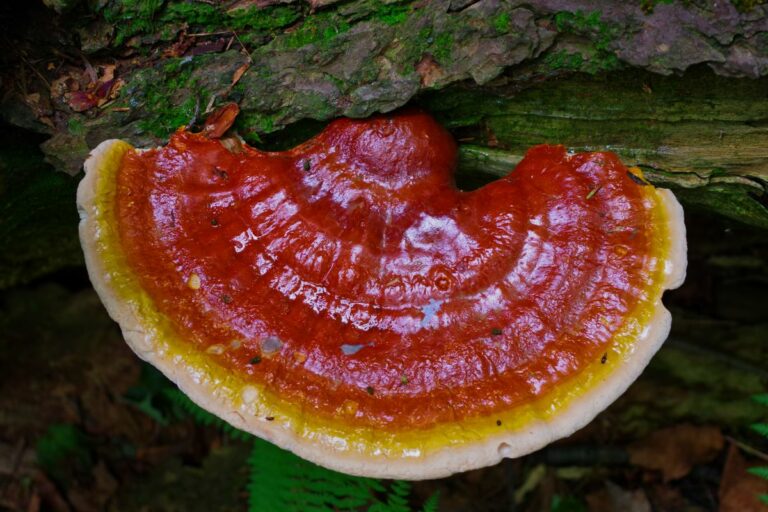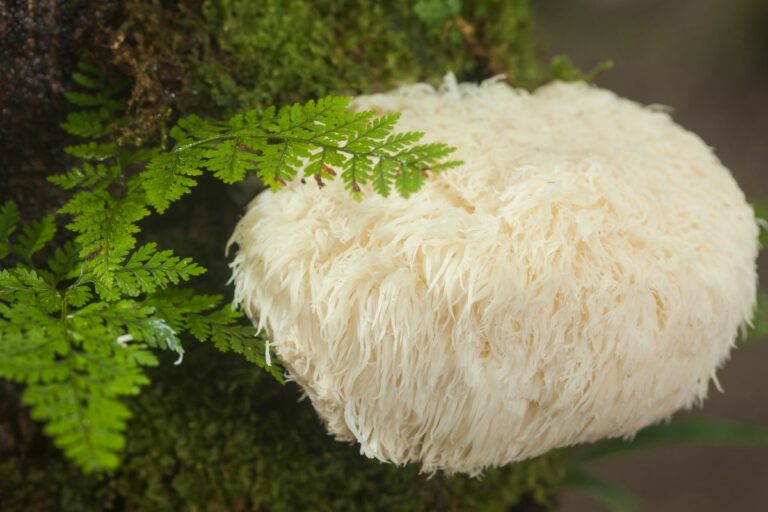As a conscientious explorer of natural health, my curiosity is often piqued by the gifts of nature that could potentially enrich our wellbeing. One such gift is the Lion’s Mane mushroom – a natural wonder that has garnered attention for its cognitive enhancing abilities. With the prevalence of ADHD diagnoses on the rise, I’ve been intrigued by the potential alignment between the benefits of Lion’s Mane and the multifaceted challenges this condition presents. Recent research has led to a budding interest in how Lion’s Mane may impact those living with ADHD.
The discussion surrounding Lions Mane and ADHD taps into a plethora of individual narratives and scientific inquiries, suggesting that this mushroom could offer significant brain health advantages. As I embark on an enlightening journey to dissect the layers of evidence and anecdote, join me in navigating the intersections and the possible therapeutic avenues that Lion’s Mane might unlock for ADHD management.
Understanding ADHD and Its Impact on Daily Life
Table of Contents
When I embarked on my journey to unearth natural remedies for ADHD, I quickly realized that to appreciate the full potential of these alternatives, one must have a profound comprehension of how ADHD affects everyday existence. To grasp the tangible effects of ADHD, allow me to guide you through its daily life impact with a focus that extends beyond the clinical definitions.
Individuals grappling with ADHD face hurdles that stem from the disorder’s hallmark symptoms: inattention, hyperactivity, and impulsivity. These challenges can manifest uniquely in each person, shaping their academic, professional, and social interactions. Through a holistic approach to ADHD, the aim is to not just treat symptoms, but to improve overall quality of life—and this is where current discourse is significantly enriched by the potential of natural remedies.
Here’s a detailed look at how ADHD typically interferes with day-to-day functioning:
- Academic and occupational performance can waver due to struggles with concentration, staying organized, and meeting deadlines.
- Interpersonal relationships and social skills may bear the brunt of impulsive actions and the difficulty maintaining attention in conversations.
- Basic daily tasks, which most find mundane or routine, can become sizeable obstacles for those with ADHD due to distractibility or forgetfulness.
Such impacts are not confined within the walls of an individual’s home or mind; rather, they ripple outward, influencing their sense of self and place within society. The continuous search for paths that lead to better management of these effects—a search often winding through the realms of holistic healing and natural remedies—is driven by a shared desire to kindle improvements that resonate through all facets of life.
“It’s more than just getting through a task list; it’s about harnessing the capacity to live fully and embrace every day with focused intention and a calm mind.”
This mindset prompts us to consider not only the cognitive aspects of ADHD but also its emotional and psychological dimensions, all of which contribute significantly to the complexities of daily life.
| Aspect of Life | Impact of ADHD | Potential Holistic Remedy Focus |
|---|---|---|
| Time Management | Procrastination and missed deadlines | Mindfulness practices and dietary adjustments |
| Relationships | Strained communication and social missteps | Social skill enhancement and emotional regulation therapies |
| Self-image | Decreased self-esteem from perceived failures | Positive reinforcement and cognitive-behavioral strategies |
| Daily Routine | Inconsistency and disorganization | Exercise routines and organized living spaces |
In conclusion, understanding ADHD’s comprehensive impact propels us towards seeking solutions that offer more than a symptomatic Band-Aid. The intersection where conventional treatment plans meet the nurturing potential of natural remedies is fertile grounds for hope and progress in the management of ADHD.
The Rise of Natural Nootropics for ADHD Management
The modern pursuit for improved cognitive function has seen a significant uptick in interest towards natural nootropics for ADHD management. Amidst the sea of pharmaceutical options, there is a burgeoning wave of individuals and healthcare professionals who are advocating for the use of these nature-derived cognitive enhancers. I find myself intrigued by this shift and the role that Lion’s Mane as a nootropic plays in it.
What Are Natural Nootropics?
Delving into the realm of natural nootropics, these substances, often hailed as ‘smart drugs,’ are known for their potential to support and improve brain functions. From memory enhancement to elevated focus, these compounds have piqued the interest of many looking for organic ways to manage cognitive challenges. Among the array of substances classified as natural nootropics, Lion’s Mane stands out for its acclaimed cognitive benefits, securing a spot in the cabinets of health enthusiasts and those coping with ADHD alike.
Why People with ADHD Turn to Natural Solutions
My exploration into ADHD natural solutions revealed a common thread: the desire for a more holistic approach to ADHD. It’s apparent that many individuals lean towards natural nootropics like Lion’s Mane to sidestep the undesirable side effects often associated with standard ADHD medications. Whether it’s in complement to conventional treatments or as a standalone regimen, the appeal for something less invasive yet effective persists.
Through my conversations with those who have ADHD, I’ve come to understand their yearning for treatments that align more closely with a vision for overall wellness rather than merely silencing symptoms.
In light of the increased demand for natural alternatives, I present you a concise comparison of why ADHD patients tend to opt for these green cognitive boosters:
| Reason for Natural Nootropic Preference | Related to Lion’s Mane |
|---|---|
| Avoidance of Side Effects from Pharmaceuticals | Reduced risk of common side effects such as insomnia and decreased appetite |
| Support for Brain Health | Potential neuroprotective and neurogenerative properties |
| Desire for Holistic Treatment | Addresses overall well-being including cognitive, emotional, and psychological aspects |
| Complementary to Other Therapies | Easily integrates with lifestyle changes and other non-pharmaceutical interventions |
In summary, Lion’s Mane as a nootropic encapsulates the desires of many searching for non-traditional methods to manage ADHD. Its rise in popularity is not merely a trend, but rather a reflection of a shift towards embracing natural remedies that offer a more comprehensive approach to mental wellness. As I continue my investigation into this fascinating subject, I am eager to uncover even deeper insights into how natural nootropics are reinventing ADHD management.

Touted for its compounds that have been observed to stimulate nerve growth factor (NGF) synthesis, Lion’s Mane remains an intriguing subject of study for its prospective role in nerve regeneration. This could have far-reaching implications, particularly for its use in enhancing mental clarity, and as many seek a lion’s mane supplement for mental focus, the potential benefits it offers are worth exploring.
But what is it that makes this mushroom so special? Here’s a breakdown of what we know:
- Neuroprotective Properties: It’s believed that antioxidants present in Lion’s Mane provide a defensive mechanism against neuronal damage, possibly supporting brain health over the long term.
- Enhancing Mental Clarity and Focus: Anecdotal evidence suggests improvements in focus and mental clarity, drawing a direct line to its burgeoning popularity among those looking to sharpen their minds.
- Nerve Regeneration: With its potential to stimulate the synthesis of NGF, Lion’s Mane is an exciting prospect for contributing to nerve repair and growth, which is invaluable for maintaining a healthy nervous system.
As I delve further into the world of nootropics, I’m consistently drawn to the possibilities that Lion’s Mane presents for not just restoring, but actually enhancing cognitive function.
In the table below, I’ve detailed the core attributes of Lion’s Mane that align with its use as a brain health supplement:
| Attribute of Lion’s Mane | Description of Benefit |
|---|---|
| Neurotrophic | Stimulates growth factors essential for nerve health and development |
| Antioxidant | Combats oxidative stress and may reduce the risk of neurodegenerative diseases |
| Cognitive Enhancer | May improve cognitive functions such as memory, attention, and focus |
While scientific exploration into Lion’s Mane is still expanding, its current reputation as a potential cognitive booster is grounded in a history of medicinal use and promising research findings. For folks like myself, intrigued by the natural world’s solutions to human challenges, the continued study of Lion’s Mane holds a captivating allure. Specifically, for those seeking lion’s mane for mental focus, this mushroom may represent a significant step towards understanding how nature can support and enhance our mental faculties.
Lion’s Mane and Mental Focus: How It May Benefit ADHD
Throughout my explorations into the realm of natural cognitive enhancers, I have frequently encountered the suggestion that Lion’s Mane could be a key ally in improving mental focus. This potential relationship is especially intriguing when considering the needs of individuals living with ADHD, who often seek remedies to sharpen concentration and cognitive abilities. Intrigued by this possibility, I’ve looked into studies examining the impact of Lion’s Mane on cognitive enhancement.

Studies on Lion’s Mane and Cognitive Enhancement
Recent research has sparked considerable interest in the capabilities of Lion’s Mane to foster neural health. Pivotal to its potential advantage for those with ADHD is the mushroom’s unique ability to stimulate nerve growth factor (NGF) synthesis. This increase in NGF could theoretically lead to enhanced neuronal development, which is paramount for improving various aspects of cognition, including concentration and memory—areas often compromised in ADHD.
My review of the scientific literature has solidified my belief in the importance of considering holistic approaches like Lion’s Mane for cognitive enhancement, particularly as it relates to bolstering mental focus.
To give a clearer picture of how Lion’s Mane might improve cognitive function, I’ve summarized the findings from current research in the table below:
| Aspect of Cognitive Function | Impact of Lion’s Mane |
|---|---|
| Concentration | Compounds in Lion’s Mane are shown to promote better focus and reduce the distractibility common in ADHD. |
| Memory | NGF stimulation by Lion’s Mane can support memory enhancement, which may counteract the forgetfulness experienced by many ADHD patients. |
| Cognitive Flexibility | The neurogenesis-promoting properties might aid in the ability to switch between tasks—a known challenge in ADHD. |
| Neural Health | By fostering NGF synthesis, Lion’s Mane supports overall neural function, which could improve a range of cognitive deficits tied to ADHD. |
Although these findings are promising, it’s important to remember that they represent a burgeoning field of study. Lions mane for cognitive enhancement is not a one-size-fits-all solution, but rather a potential supplement to be considered among a spectrum of treatments for ADHD.
It’s my hope that further research will continue to illuminate the specific ways in which lions mane and concentration can coalesce into a therapeutic union, offering those with ADHD a natural and effective tool to improve their daily cognitive functioning.
The Neurological Effects of Lion’s Mane on the Brain
In my continuous search for understanding the instrumental role certain natural supplements can play in brain health, I’ve turned my analysis towards the neurological benefits of Lion’s Mane mushroom. Groundbreaking research enfolds Lion’s Mane not only as a culinary delight but also as a significant contributor to cognitive wellness, engaging my utmost attention in its promise for advancements in neurological sciences.
My findings have keenly positioned Lion’s Mane amidst discussion circles where brain health and neurogenesis are of primary concern. Let me unveil how the constituents within this extraordinary fungus may orchestrate the symphony of the mind, giving rise to enhanced brain functions that are particularly beneficial amidst the cognitive symptoms associated with ADHD.
Plunging into a myriad of scientific journals, I found myself astonished by reports that evidence this mushroom’s prowess to promote neurogenesis – a cornerstone in the fortification of neuronal integrity and plasticity.
I believe it’s essential to comprehend the intricate details that sketch the contours of Lion’s Mane’s neurological impact:
- Neurogenesis: The mushroom houses bioactive compounds that fuel the birth of new neurons, an intriguing prospect for brain regeneration.
- Neuroprotection: The antioxidants present in Lion’s Mane exact a guardianship role, shielding neuronal cells from degenerative conditions.
Let’s critique the core features of Lion’s Mane and its proposed neurological enhancements:
| Feature | Neurological Benefit | Relevance to Brain Health |
|---|---|---|
| Stimulation of NGF | Promotes the production of nerve growth factors | Necessary for neuronal growth and maintenance, potentially aiding cognitive functions compromised in ADHD |
| Antioxidant Properties | Protects against neuronal damage from oxidative stress | Defensive against cognitive decline and supports overall brain health |
| Myelin Sheath Support | Encourages the integrity of the myelin sheath | Crucial for effective neuronal signaling and cognitive speed, possibly ameliorating ADHD-related symptoms |
As I carefully intertwined the threads of evidence, my conviction solidified in the potential of Lion’s Mane as a benefactor of the mind, possibly offering a beacon of hope for those battling the cognitive trials that accompany ADHD.
The narrative of lions mane and brain health is steadily unravelling through ongoing research. Nonetheless, the current dialogue offers a persuasive argument for incorporating Lion’s Mane into a regimen aiming to promote neurological wellness and cognitive resilience.
As I stride further along this path, the essence of my inquiry remains focused on how natural elements like Lion’s Mane can be harnessed to enrich our neurological health, particularly for those whose cognitive capabilities are often amidst a tumultuous dance with distractions and impairments brought forth by ADHD.
Comparing Lion’s Mane to Traditional ADHD Medications
As someone ever-curious about natural remedies, it’s fascinating to compare the effects of Lion’s Mane with traditional ADHD medications. Decades of reliance on pharmaceuticals to manage the symptoms of ADHD have produced a dual narrative—one of success stories and one of struggles with side effects.

Benefits and Downsides of Pharmaceutical Interventions for ADHD
The use of medications like Adderall, Ritalin, and Vyvanse has been standard practice in treating ADHD. These stimulant medications can significantly improve concentration, decrease impulsivity, and provide better overall control of behaviors. However, my attention has been drawn to the downsides of ADHD drugs, with sleep disturbances and appetite loss being among the commonly reported side effects.
Discussions with numerous individuals have led me to understand that managing one’s neurological wellness demands a broad perspective—a contemplation of benefits balanced against possible detriments.
Here is a comparative overview of the prevalent ADHD medications against Lion’s Mane:
| Medication | Benefits | Common Downsides |
|---|---|---|
| Stimulants (Adderall, Ritalin) | Increases alertness, attention, energy | Insomnia, loss of appetite, potential for abuse |
| Non-stimulants (Strattera) | Improves focus, less potential for abuse | Slower onset, some sleep and appetite issues |
| Lion’s Mane | Supports neurogenesis, cognitive function | Fewer known side effects, long-term benefits unclear |
In examining these options, it’s clear that while traditional medications have their place in ADHD management, the pursuit of alternatives with fewer side effects is both logical and necessary.
How Lion’s Mane Could Complement ADHD Treatment
My curiosity pushes me to uncover how natural remedies can fit within the larger ADHD treatment framework, and here’s where Lion’s Mane enters the scene. This unique mushroom has been identified for its purported role in enhancing neurogenesis and cognitive function—attributes that could potentially complement ADHD treatment.
The potential for Lion’s Mane to work in synergy with established ADHD drugs invites a refreshed outlook on treatment modalities. Patients facing challenges with traditional medication side effects may experience relief by incorporating Lion’s Mane.
| ADHD Treatment Aspect | Contribution of Traditional Medications | Potential Complementary Role of Lion’s Mane |
|---|---|---|
| Cognitive Enhancement | Immediate improvement in focus and cognitive speed | May contribute to long-term cognitive health and plasticity |
| Neurological Support | Addresses symptoms related to neurotransmitter imbalances | Supports neurogenesis and nerve health |
| Side Effect Mitigation | Requires careful management and potential lifestyle changes | Offers a natural alternative with reportedly fewer side effects |
Delving deeper into the comparison, the 8 natural compounds in Lion’s Mane work differently from stimulants and non-stimulants. They offer a promise not typically found in synthetic drugs:
- A holistic approach that may address root issues rather than merely symptomatic relief
- An opportunity to potentially decrease reliance on higher doses of traditional medications
- A natural path that aligns with a more organic lifestyle and wellness philosophy
To conclude this section, I find that Lion’s Mane could be a viable option for those seeking to temper the aggressive approaches of traditional ADHD medications. Whether as a stand-alone option or in conjunction with established therapies, Lion’s Mane warrants consideration for its place in the expanding landscape of ADHD management strategies.
Lion’s Mane Supplement Forms and Dosage Considerations
As I delve deeper into the exploration of natural remedies, I have discovered that Lion’s Mane supplements are not a one-size-fits-all solution, especially when it comes to dosage. This mushroom’s versatility extends to its availability in various forms such as powders, capsules, and tinctures, contributing to differences in how they might be taken and their subsequent impact on the body. Determining the ideal lions mane dosage can be as nuanced as understanding the variations in efficacy for each form of this supplement.
Let’s consider the diverse array of lions mane supplement forms and the typical dosage recommendations:
- Powders: Often used in teas or blended into smoothies, powders offer versatility and easy dose adjustment. Dosage is generally measured in teaspoons or grams.
- Capsules: Providing convenience and precision, capsules are a preferred choice for those seeking a quick and consistent dosage, carefully measured by manufacturers.
- Tinctures: Typically administered with a dropper, tinctures allow for direct and rapid absorption, potentially resulting in quicker effects. The dosage is usually counted in drops or milliliters.
Across each form, the question of how much Lion’s Mane to take is pivotal. The consensus among experts is that there is no standardized lions mane dosage, as it varies based on factors such as age, weight, health status, and individual response. Nonetheless, product labels and healthcare providers often suggest a starting point for dosage, which can then be adjusted as needed.
I’ve come to appreciate the personal nature of dosage determination and the journey of finding what works for each individual seeking cognitive or neurological support from Lion’s Mane.
To aid in visualizing this topic, I’ve assembled a table that delineates common dosage ranges for each form:
| Supplement Form | Common Dosage Range | Notes |
|---|---|---|
| Powders | 1-3 grams per day | Beginners should start at the lower end and gradually increase as tolerated. |
| Capsules | 500-2000 mg per day | Dosages are pre-measured, though it’s important to follow the specific brand’s recommendations. |
| Tinctures | 1-3 mL per day | Can be consumed directly under the tongue or added to water or juice. |
Careful consideration and calibration are critical in determining the effective dose that meets one’s personal health objectives. While there is a general guideline for lions mane dosage, it often comes down to individual trial and response to find the sweet spot under the guidance of a healthcare professional.
In my continuous journey to unlock the secrets of natural health remedies, I find that the exploration of dosage and the different supplement forms lays the groundwork for a more personalized and informed experience with Lion’s Mane mushroom.
Personal Experiences: Testimonials on Lions Mane and ADHD
As I’ve navigated the complex terrain of ADHD management, personal anecdotes surrounding Lion’s Mane have piqued my interest. A collective of voices shares their personal experiences with Lion’s Mane, recounting the transformative effects on their daily lives. Many speak of calmer minds and a newfound ability to focus, attributing these benefits to their regimen of Lion’s Mane supplementation.
One individual mentioned, “After incorporating Lion’s Mane into my lifestyle, my ability to concentrate improved significantly, changing the way I tackle my work and personal projects.”
Such lions mane ADHD testimonials give us unique insights into the real-world impacts of this natural nootropic. However, it’s essential to approach these testimonials with a discerning mind, recognizing that while they are powerful, they do not carry the same weight as scientific validation. Below is a table capturing diverse testimonials that outline varied experiences with Lion’s Mane:
| User Profile | Duration of Use | Reported Benefits | Additional Comments |
|---|---|---|---|
| Adult Female, Professional | 6 months | Enhanced focus, reduced impulsivity | Mentions better management of work tasks and personal organization |
| College Student | 3 months | Improved academic performance and concentration | Reports feeling less overwhelmed by coursework |
| Adult Male, Entrepreneur | 1 year | Greater mental clarity, increased productivity | Attributes success in managing multiple projects to Lion’s Mane |
| Middle-aged Parent | 8 months | Calmer demeanor, less daily frustration | Expresses gratitude for a more patient approach to parenting |
In examining these testimonials, patterns emerge that suggest a potential correlational relationship between Lion’s Mane supplementation and improved cognitive features among ADHD populations. These personal experiences with Lion’s Mane illustrate a spectrum of individual responses, each narrative contributing to a rich tapestry of anecdotal evidence.
Beyond this qualitative data, the possibility of Lion’s Mane enhancing cognitive abilities opens new doors for conversations about treating ADHD. It’s crucial to reiterate that testimonials are not conclusive proof but offer a heartening glimpse into what may be possible for some individuals.
Another user shared, “Lion’s Mane has been a game-changer for my ADHD symptoms, helping me to stay focused and navigate my day with less chaos in my thoughts.”
These stories resonate with a common thread—hope for a natural approach that addresses the core symptoms of ADHD without the burden of adverse side effects. Although each journey is unique, the collective voices of these testimonials highlight the potential effects of Lion’s Mane as an ally against the challenges posed by ADHD.
As your guide through this explorative terrain, my commitment to sharing genuine narratives necessitates a degree of caution. While first-hand accounts are valuable, they are not substitutes for professional advice or empirical evidence. I encourage readers to view these testimonials as pieces of a larger puzzle in understanding the scope and impact of Lion’s Mane on ADHD. As our knowledge expands, so too will our ability to discern the role of Lion’s Mane within a holistic ADHD management strategy.
Precautions and Potential Side Effects of Lion’s Mane
In my dedicated review of natural supplements, the need for responsible use rises to the forefront. Despite the many benefits associated with Lion’s Mane, particularly for cognitive enhancement and nerve health, it is imperative to consider the lions mane precautions and acknowledge the possibility of lions mane side effects. Though reports suggest that Lion’s Mane is generally safe for consumption, as with any supplement, there are potential interactions and reactions to keep in mind.
Interactions with Medications and Other Supplements
One key area to watch is the interaction between Lion’s Mane and other medications or supplements. The complexities of biochemistry imply that the constituents of Lion’s Mane may modify or be modified by various pharmaceutical agents, altering their intended effects. Engaging with one’s healthcare provider before mixing supplements with ongoing medication regimens is not merely a good practice—it’s essential.
Mild digestive issues, which may include bloating, discomfort, or changes in bowel movements, are among the self-reported side effects of Lion’s Mane. While usually not severe, these symptoms can be disconcerting and may warrant discontinuation or dosage adjustment of the supplement.
As I continually advocate for well-informed supplementation strategies, it is crucial to listen to one’s body and seek medical advice when introducing any new element into one’s wellness regime, especially for those with pre-existing health considerations.
Allergies, though rare, are another concern. Those with known sensitivities to mushrooms should proceed with particular caution when considering Lion’s Mane, as allergic reactions can range from the mild to the serious. Monitoring one’s response to the supplement initially can preempt more severe reactions.
Consequent to my in-depth analysis, I’ve prepared the following table, summarizing the potential side effects and considerations pertinent to supplementing with Lion’s Mane:
| Potential Side Effect or Interaction | Description | Precautionary Measures |
|---|---|---|
| Medication Interactions | Lion’s Mane may affect the activity of certain medications, including blood thinners and diabetes drugs. | Consult with a healthcare provider before starting Lion’s Mane if taking prescription medications. |
| Digestive Issues | Some users report mild stomach discomfort or changes in digestion. | Adjusting the dose or discontinuing use may be necessary if symptoms persist. |
| Allergic Reactions | Though infrequent, allergic reactions to mushrooms can occur, ranging from rash to more severe symptoms. | Begin with a small dose to test for allergies and monitor reactions closely. |
To conclude, the tenets of mindfulness and prudence govern the incorporation of Lion’s Mane into one’s health routine. When wielded with due care, this natural supplement holds a trove of potential benefits, yet the imperative of managing its use with an eye to the possible lions mane precautions and side effects cannot be overstated. In pursuit of cognitive and neurological betterment, one must navigate these waters with circumspection, ensuring the journey towards improved health remains both effective and safe.
Conclusion
Throughout this exploration, the ties between lions mane and ADHD have unfurled like an intriguing natural scroll, revealing the possibility that this remarkable mushroom could play a role in a holistic approach to ADHD management. While the anecdotal testaments have been illuminating and the scientific inquiry compelling, it is paramount to remember that the path to understanding Lion’s Mane’s full effects on ADHD is still being charted. The promise held within its fibers is matched by the need for further research, to distill hope from hyperbole and anchor benefits in proof.
My journey, deep into the intersecting worlds of cognitive enhancers and ADHD therapies, has only confirmed my belief in the value of a comprehensive strategy for managing this complex condition. The varied responses to Lion’s Mane, as found in the narratives and studies I’ve considered, underscore the necessity of a personalized treatment plan—one that can adapt to the unique cognitive landscapes of each individual.
In summing up, the potential of Lion’s Mane as an ally in ADHD management is intriguing yet requires more exploration, more understanding. As both an investigative journalist and a proponent for natural health, I remain committed to following this story wherever it may lead, with the hope that it might one day furnish a validated, natural facet to the multifaceted approach we take to ADHD. Its strength, after all, lies not in being the panacea, but a part of a concerted, holistic effort towards cognitive well-being.
FAQ
How is Lion’s Mane connected to ADHD management?
Lion’s Mane mushroom may benefit ADHD management through compounds that stimulate nerve growth factor and support neurogenesis, potentially improving mental focus and cognitive functions that are challenging for individuals with ADHD.
What impact does ADHD have on daily life?
ADHD can significantly affect daily tasks, academic performance, and interpersonal relationships, due to symptoms like inattention, hyperactivity, and impulsivity.
What are natural nootropics, and how can they help with ADHD?
Natural nootropics are cognitive enhancers derived from natural sources that aim to improve brain functions. For those with ADHD, natural nootropics like Lion’s Mane may help in managing symptoms by enhancing mental clarity and concentration.
Why do people with ADHD turn to natural solutions?
Individuals with ADHD may seek natural solutions to avoid the side effects associated with pharmaceuticals, to complement their current treatments, or to embrace a more holistic approach to their health concerns.
What is Lion’s Mane mushroom and what are its mental focus benefits?
Lion’s Mane is a medicinal mushroom known for its neuroprotective properties, which may offer benefits for mental clarity, focus, and nerve regeneration, potentially aiding those with ADHD in managing their symptoms.
Are there any studies that support Lion’s Mane as a cognitive enhancer?
Yes, there are studies indicating that Lion’s Mane mushroom has compounds that promote the synthesis of nerve growth factor (NGF), which may in turn enhance mental focus and cognitive abilities relevant to managing ADHD symptoms.
How does Lion’s Mane affect brain health neurologically?
Lion’s Mane is believed to promote neurogenesis and offer neuroprotective effects, which could support brain health and potentially alleviate cognitive symptoms related to ADHD.
What are the benefits and downsides of pharmaceutical interventions for ADHD?
While traditional ADHD medications can be effective in managing symptoms, they may carry side effects such as sleep issues, loss of appetite, and others. People often seek alternatives to find a balance between efficiency and tolerability.
How could Lion’s Mane complement traditional ADHD treatment?
Lion’s Mane might support ADHD treatment by enhancing brain function and cognitive performance through natural means, possibly providing a complement to pharmaceutical interventions with fewer known side effects.
What forms and dosages do Lion’s Mane supplements come in?
Lion’s Mane supplements are available in various forms, including powders, capsules, and tinctures. The appropriate dosage depends on factors such as age, overall health, and the specific health goals of the individual.
Can you share personal experiences of using Lion’s Mane for ADHD?
There are many personal testimonials that reflect positive experiences with using Lion’s Mane for ADHD symptoms; however, it’s important to note that these are anecdotal and not a substitute for scientific evidence.
What precautions should be taken when using Lion’s Mane?
While Lion’s Mane is generally considered safe, it could interact with certain medications or supplements. Users should also be aware of possible mild digestive issues or allergies and consult with a healthcare provider before starting any new supplement regimen.
Are there potential side effects of taking Lion’s Mane?
Most users find Lion’s Mane well-tolerated, but some may experience mild side effects such as digestive discomfort. It’s also important to consider potential allergies or interactions with other medications or supplements.








